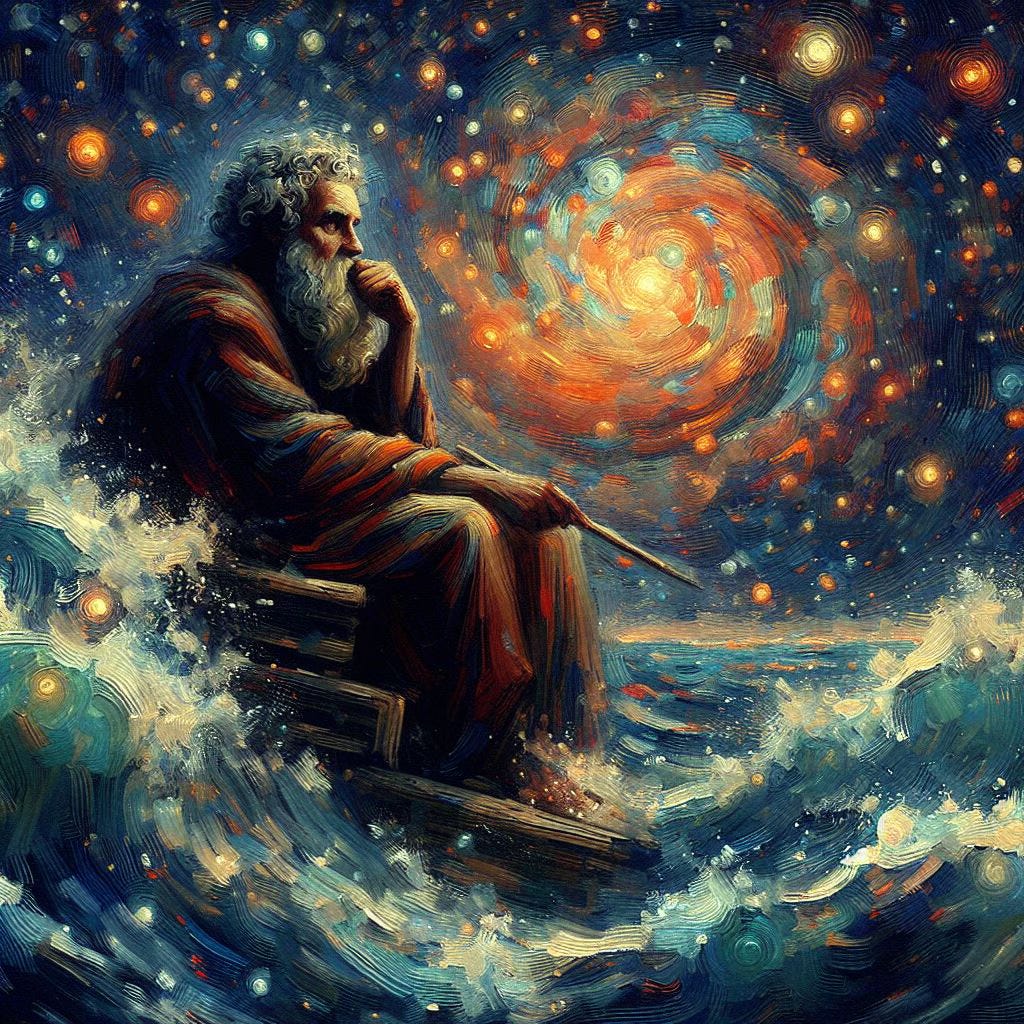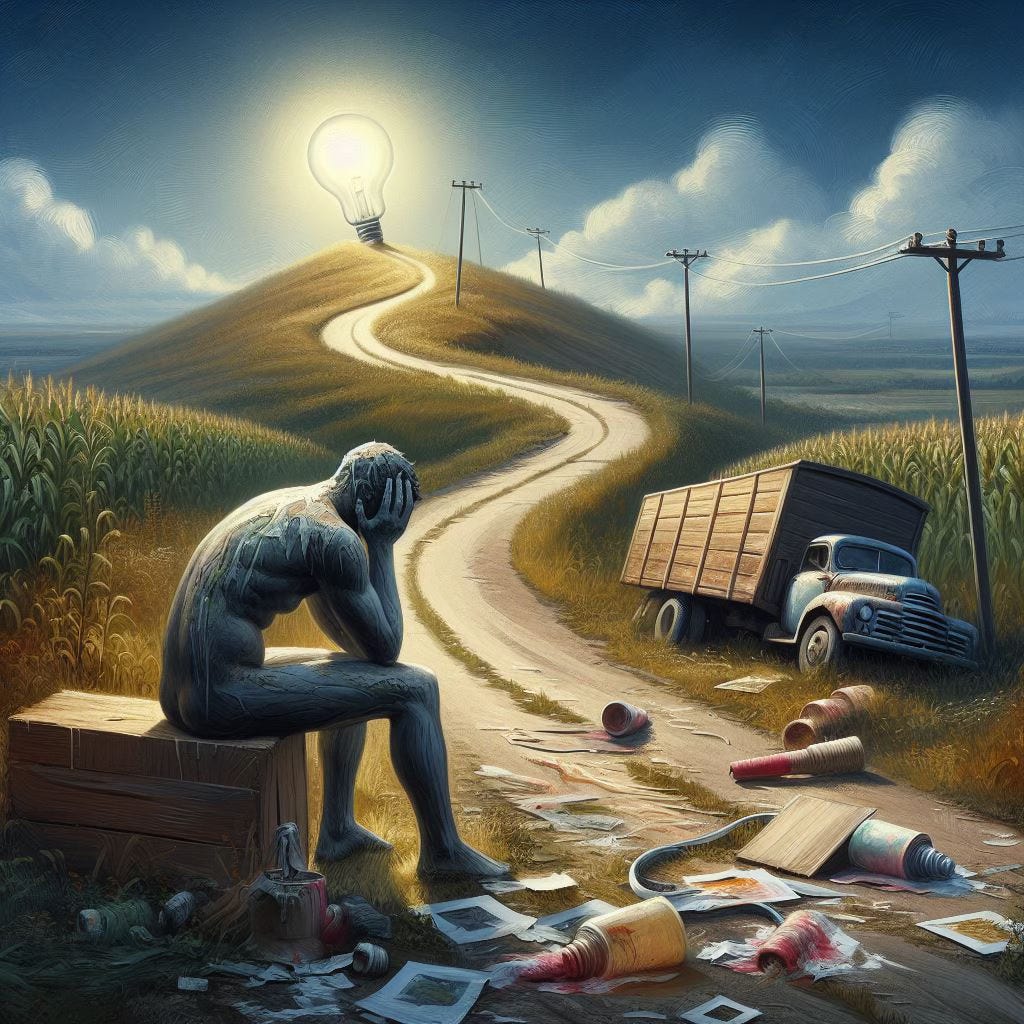“If you always do what you’ve always done, you’ll always get what you’ve always got.”
Henry Ford
Hello Friends,
We can’t improve if we don’t change. Self-development is change. Remember that we need to know three things to improve: where we are, where we want to go, and how to get there. Change is the very process by which we get from where we are to where we want to be.
But change is hard. If it were easy, all of us would be Stoic sages, living in virtue and harmony. So what is the nature of change? And why do so many of us know, on some level, that there are things about us that we need to modify, yet we fail to do so?
The audio version of this episode is available on Spotify, Apple Podcasts, Stitcher, and wherever else you listen to your podcasts.
The Nature of Change
Change is hard, yes, but it’s also inevitable. The Stoics spoke much about how things never stay the same. Take the honorary Stoic Heraclitus:
“Everything changes and nothing remains still; and you cannot step twice into the same stream.”
Heraclitus
The reasoning behind this fragment of Heraclitus is that the river itself changes constantly, and you have also changed.
Therefore, it’s worth first stating that when we are talking about change in the philosophy as a way of life world, we are talking about meaningful, productive change. We are talking about change in a specific direction: towards a good character.
Positive change rarely happens on its own. It’s possible, as many things are, but shouldn’t be considered the norm.
“No man was ever wise by chance.”
Seneca
In fact, change tends to be naturally towards regression. Take going to the gym. You have to work really hard to see improvement. What do you have to do to see negative improvement? Nothing! If you do nothing, you will regress.
Sometimes life pushes us in a particular way that naturally generates positive change, but it only does so if we have intention to generate it. This can be explained simply with the dichotomy of control. What is good in Stoicism is your character, and only you can change your character. Everything else is not up to you.
So change is inherent in the structure of the universe, but if we wish to have positive change, we must be the drivers. Similar to how the wind and current of the ocean will move your boat, only you, with the use of your sail and rudder can get you to where you want to go. And there’s a little lesson in that, too: if you don’t have intention, you’ll still go somewhere; it just might not be anywhere good.
On the Difficulty of Personal Change
There is always a gap between what we know to be true and how we act in the world. Even if you were totally bought in to the “virtue is the only good” thing, you’re going to make mistakes along the way towards virtue. You’ll fail, at times, you’ll stumble, and hopefully you’ll get back up.
Let’s take a modern, universal example: social media use.
I think that most of us spend too much time on social media. I think the statistics are clear on that. And those who don’t use it, they are often regarded as eccentric. “What do you mean you’re not on social media?”
We know it’s not good for us. We scroll through endless reels, getting a tiny yet very insufficient hit of dopamine every time. Our reward systems are drained. And here’s the weird thing: we seem to know it’s bad as we’re doing it.
As we scroll, there’s a little voice saying “you’re wasting time”. “This isn’t even enjoyable anymore”. “You should stop”.
Of course, social media can be used in an appropriate way. But how many of us are using it inappropriately? How many of us use it to avoid feeling bored? To procrastinate at work? To avoid feeling awkward at the Starbucks lineup?
Yet… how many of us are taking active steps to reduce our use? We tell ourselves that we will simply keep the app on our phone and not use it. Yet, we get bored, we feel awkward or anxious, we open our phones, and we start scrolling.
If you really believed that social media is a problem for you, wouldn’t you do everything that you can to stop? Wouldn’t you remove the app from your phone, or at least use one of those apps that shut off your usage after an hour or so?
You’d think we would. But we don’t. It’s a curious thing: why do we continue to do things that we know are not good for us? Why do we not take the steps on the road to becoming more fulfilled?
Wandering into the Unknown
Most of us are more scared of the unknown than we like to admit. Sure, we like watching marvel movies of heroes defeating villains and saving the world, yet the thought of getting outside of our own comfort zone terrifies us so much that we never wander from our treadmill.
People take comfort from familiarity. We can use the example of personal relationships.
Let’s say you have a friend that you’ve known for years. You spend a lot of time together, but you know that they aren’t demanding the best from you. You know that they are influencing you to stay home and play video games, or to hate the world, or to stay overweight. You know this, that the friendship isn’t good for you. But you stay. Why?
Well, because it’s your friend! You’ve known them forever. You’re comfortable. You know they’re not the best for you, but you know them. You know what you’re getting. If you were to stop hanging out with this person, what would that mean?
It would mean that you may have to be friendless for a while. That’s a little unpleasant. It would also mean that you would have to go out into the world and try and make a new friend. That sounds really unpleasant.
And who even knows if it would be successful? What if you never end up making a new friend and you spend the rest of your life alone? What if, what if, what if?
We stay in our current life, not always because we don’t know any better or because we don’t have agency to change, but because we are afraid of what’s out there on that journey. Take the exchange between Gandalf and Bilbo in The Hobbit before Bilbo agrees to go on an adventure:
Gandalf: “You'll have a tale or two to tell when you come back.”
Bilbo: “You can promise that I'll come back?”
Gandalf: "No. And if you do, you will not be the same.”
Why don’t we change? Perhaps, in large part, it’s because we are afraid of the journey that facilitates change, and we are geared to avoid unpleasantness.
Let’s Get Practical: How Do We Change?
We’ve established what change is, why it’s important, and why we struggle with it. Assuming we know where we want to go, how do we get there, practically?
The first step is to confess. Yes - you need to confess where you are missing the mark. This is no easy thing, but you can probably list out pretty quickly the areas that you are missing the mark. What’s holding you back? What don’t you need in your life? What’s things are wasting time in your day? Here are some common ones:
Too much social media
Unproductive relationships
Unhealthy eating habits
Too little exercise
Then, you need to write down a corresponding action that facilitates positive growth. This depends on where you are. Your goals must be realistic given the context of you. But here are some possible actions:
Too much social media → Limit social media use to 1 hour a day
Unproductive relationships → Try something new with the intention of connecting with people that you admire (rock climbing, diving, knitting, etc.)
Unhealthy eating habits → Put all of your junk food in the most troublesome cupboard in your kitchen (high up, behind a case of Bubly)
Too little exercise → Make a habit of walking for 10 minutes every morning
Clearly, these goals are examples and change depending on where you are. But this is the process. Confess where you are missing the mark, and then develop an action plan. You must have clarity on where you want to go, and you need actionable goals.
But even before all of that, you have to understand and accept that for you to change means work. It means venturing into the unknown. It means being uncomfortable. It means failing. And, perhaps most importantly, it means faith. Faith that you can get better. Faith that, once you make a good decision, the universe will help you out.
“Once you make a decision, the universe conspires to make it happen.”
Ralph Waldo Emerson
There isn’t anything unscientific about that statement. What happens is that your perception of the world changes based on your goals. If you fully commit to a goal, let’s say to make a new friend, you will begin looking for opportunities to make new friends. And, with a bit of luck and a lot of courage, maybe you can sail against the wind and current. Maybe you can get to your destination of your own accord. You are going somewhere; know that. But do you want to wander aimlessly through life, or with purpose?
Support the Show
You can expect one free episode of the podcast every single Tuesday. These episodes will either be a 20-minute (or so) solo episode diving deep into a single philosophical topic, or a guest episode, where I bring on incredible guests to chat philosophy.
For the full Strong Stoic experience, I encourage you to consider becoming a paid subscriber. You’ll get access to premium episodes of the Paradoxically Speaking podcast with Joshua Bertolotti, access to my Steps to Success interview series, a bi-weekly exclusive article analyzing a particular quote, and additional benefits from time to time.
***If you’d like to become a paid member but cannot afford it, feel free to contact me directly; I’ll happily provide a complimentary membership (no questions asked).
Stay Connected
Brandon Tumblin is most well-known for his podcast, The Strong Stoic Podcast, where he discusses philosophical ideas (solo and guest episodes).
Brandon is also a writer for THE STOIC, the official journal of The Stoic Gym.








